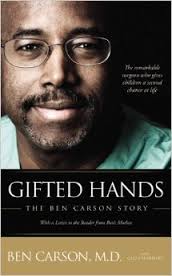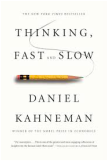Author: Ben Carson M.D.
ISBN: 978-0-310-33290-9
APA Style Citation
Carson, B. (1990). Gifted Hands: The Ben Carson Story. Review and Herald; Grand Rapids, Michigan.
|
| ||||
In light of the announcement of Ben Carson’s declaration that he will be running for president in 2016, it seems appropriate to take a closer look at the individual who until now was primarily known as a pediatric surgeon at John Hopkins hospital. In Gifted Hands, Carson recounts his tough childhood in Detroit and the challenges he faced academically growing up. Carson credits his mother’s persistence with allowing him to see his own talents and to persevere in the face of failure and challenges. Ben’s parents were divorced and his mother, despite trying to encourage her two children to excel, suffered from mental illness. As a result, Ben and his brother periodically lived with family members while his mother sought treatment. When Ben’s mother was present, she had strict rules and expectations. Ben and his brother Curtis were limited to watching two television shows per week and were encouraged to read at least two books per week in addition to completing their schoolwork and helping around the house. While they initially complained, they both found a love of reading and excelled academically (Curtis is an engineer). Ben’s mother expected the best from her sons and despite Ben’s poor grades in middle school and part of high school; she never lost her faith in his abilities. She seemed to know what Ben was capable of even if he did not yet realize it himself.
In his teens, Ben had to learn to control his temper, because when other children teased him because of his perceived lack of intellect or his out of style clothes, he would sometimes lash out. Ben once tried to stab a friend in a fit of rage, but thankfully instead of hitting his friend’s belly, he hit his belt buckle. Ben became so frightened by what he could have done that he turned to God for guidance. Ben would continue to seek this guidance throughout his life and from that point on, he claims, he no longer had a problem with his temper.
Carson was initially interested in rocks and geology, but later became interested in becoming a missionary doctor. He became interested in psychology when his older brother bought him a subscription to Psychology Today for his birthday. By the end of high school, Ben had earned a 90 percent scholarship to Yale. While he was thrilled to attend the Ivy League school, he found it difficult because everyone at Yale had been successful at their respective high schools and the competition was intense. Ben found chemistry particularly difficult and believed that failure in this subject might prevent him from achieving his chosen career path of neurosurgery. Ultimately, he credits God with his ability to pass chemistry and his future success. During his time at Yale he also met his future wife Candy who was a musician and shared Ben’s faith and love of classical music.
Ben successfully graduated and completed his internship at John Hopkins Hospital; he was selected as one of 2 interns from 125 potential candidates. He learned much during his internship and residency and often took on cases that others were not interested in treating. In one instance, a young man came in who had been hit with a baseball bat. This required immediate surgery, but as a resident Ben did not have the authority or experience to conduct the surgery. All of the other doctors were away at a conference and Ben had to make a decision. He risked his career, and luckily the surgery went well and the hospital did not fire Ben. The man recovered and had it not been for Ben’s quick action, he would have likely died.
After all of his schooling was complete, Ben decided he wanted to remain at John Hopkins and eventually became the head of the pediatric neurosurgery department. While Ben is careful to acknowledge others who have helped him in his career, it is also clear that he sees his career at God’s fate and himself as an extraordinarily gifted individual. He claims that his divine gift of eye and hand coordination made him an outstanding surgeon thus the name of the book, Gifted Hands. He also cites many instances in which his ability to think differently allowed him to see a way to improve a surgical procedure or complete procedures others claimed were impossible. Carson claims that even as a medical student he knew more about neurosurgery than the intern and junior residents and as a result, they relied on him and gave him more cases. Carson also indicates that he was nice to everyone and that because of “help from the lower echelons” he was able to find success in his career. Carson faced some discrimination or surprise from those who had never seen or did not expect to have a black surgeon; but ultimately his ability won out and people began to seek him out because of his surgical abilities and medical knowledge.
Carson is perhaps most well known for his work in performing hemispherectomies, often on children who were experiencing uncontrollable seizures. His first hemispherectomy was conducted on 4-year old Maranda Francisco who suffered from almost constant seizures impacting only the right side of her body. She would have almost certainly died without the surgery. Many others told her mother to give up hope because there was nothing that could be done for her daughter but Carson believed the surgery would work. Today, Maranda leads a normal life and because of the plasticity of the brain in young people, she has regained most of the motor functioning on the right side of her body.
Carson was part of the 70-person team that separated a pair of conjoined twins in the first surgery of this kind. The twins were joined at the back of the head and the pre surgery preparation included inflating balloons under their skull to create enough skin to cover the area that would be separated. They also used cadaver bones to create a new portion of the skull. There is some dispute about the success of the surgeries, but both boys lived through the 22-hour procedure. In many of the cases Carson completes, it is difficult to know how the patient will fare in the long run. Many patients who undergo brain surgery must be placed in a coma because of the swelling in the damaged brain. Not all surgeries are successful and Carson laments those patients he has lost, in particular the youngest patient (only 3-months old) who started convulsing after the surgery and lived only a few more weeks. Carson’s future as a surgeon is unclear given his bid for the presidency, however his contributions to neuroscience will remain intact.
Other Related Resources
New York Times article about the work of Ben Carson at John Hopkins
http://www.nytimes.com/1993/06/08/science/scientist-work-benjamin-s-carson-for-many-pediatric-neurosurgeon-folk-hero.html
Gifted hands, The Ben Carson Story
Cuba Gooding Jr. plays Ben Carson in this full-length film
https://www.youtube.com/watch?v=s33R7JhFO6s
Article about reunion of those with hemispherectomies
https://news.google.com/newspapers?nid=1917&dat=19870827&id=DQ0hAAAAIBAJ&sjid=b3IFAAAAIBAJ&pg=1009,6038920&hl=en
Ben Carson for President website
https://www.bencarson.com
How is Ben Carson spending his campaign donations?
http://www.motherjones.com/politics/2015/07/ben-carson-campaign-private-jets-luxury-hotels
Conjoined Twins
http://www.independent.co.uk/life-style/health-and-families/features/separate-lives-conjoined-twins-2357401.html
The Binder Twins
http://www.apnewsarchive.com/1989/Binder-Twins-Far-From-Normal-Two-Years-After-Surgery/id-424f811a9feb67934f4c3b6e86586ae2
Psychological Figures and Concepts
Brain stem
Broca’s area
Craniotomy
CT scans
Dura matter
Epilepsy
Grand mal seizure
Hemispherectomy
MRI
Occipital Lobe
PET scans
Plasticity
Rasmussen’s encephalitis
Temporal lobes


 RSS Feed
RSS Feed